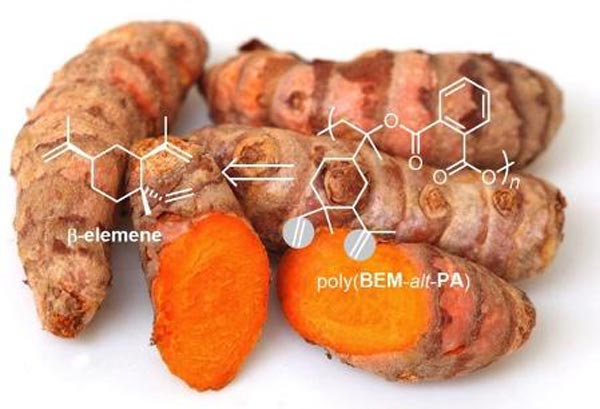The expanding possibilities of bio-based polymers

ICIQ ACS kleij ginger root
Credit: ICIQ/Francesco Della Monica
Researchers from the Kleij group present a new route to prepare biobased polyesters with tuneable properties.
Finding innovative and sustainable solutions to our material needs is one of the core objectives of green chemistry. The myriad plastics that envelop our daily life – from mattresses to food and cars – are mostly made from oil-based monomers which are the building blocks of polymers. Therefore, finding bio-based monomers for polymer synthesis is attractive to achieve more sustainable solutions in materials development.
In a paper published in ACS Sustainable Chemistry & Engineering, researchers from the Kleij group present a new route to prepare biobased polyesters with tuneable properties. The researchers are building upon the multifunctional structure of the terpene β-elemene: three double bonds which have distinct reactivity, allowing to selectively transform these bonds and thus tweaking the functionalities in the backbone of the polymer.
“This multi-functional terpene scaffold is rather unique and allows to fine-tune structural diversity and prospectively to modulate polymer and material properties,” explains Arjan Kleij, ICIQ group leader and ICREA professor.
In collaboration with the company Isobionics, the researchers utilised β-elemene obtained through an innovative sugar-fermentation route. This process has proved to be a promising start for the use of β-elemene as a raw material for polymerisation. “Isobionic’s sugar-fermentation route completely changes the scale of β-elemene availability, which now can be used in polymer production,” explains Francesco Della Monica, postdoctoral researcher in the Kleij group working in the European SUPREME project, an MSCActions Individual Fellowship and first author of the paper.
Via a ring-opening copolymerisation reaction (ROCOP), the researchers combined β-elemene oxides and phthalic anhydride (a common monomer used in the preparation of polyesters) to create the biobased linear polymer poly(BEM-alt-PA) and its related structure, crosslinked-poly(BED-alt-PA). These transformations were achieved with catalytic systems (iron and aluminium aminotriphenolate complexes combined with bis-(triphenylphosphine) iminium chloride) developed previously by the group using non-critical, abundant elements for catalytic polymerisation.
Once the polyester is prepared, there are two remaining double bonds from the original terpene building block that can be easily and selectively addressed and functionalised, allowing to tailor the final polyester. “These post-modification reactions on a biobased polymer are quite rare. Most of the biobased monomers that are available don’t present functionalities,” remarks Della Monica.
The paper is a starting point for further development of β-elemene based polymers that allow tailoring the properties of the final material (depending on its use) through easy post-polymerisation modifications. The paper does not address the biodegradation of the material, although for Della Monica, “depending on the final use, the ideal thing may not be biodegradation but to create a recyclable polymer: i.e., take a starting material, create the polymer, use it, recover it, and then degrade it in a controlled fashion and reuse that material. Now that we have the idea of a circular economy within grasp, we need circular processes,” concludes the scientist.
All latest news from the category: Materials Sciences
Materials management deals with the research, development, manufacturing and processing of raw and industrial materials. Key aspects here are biological and medical issues, which play an increasingly important role in this field.
innovations-report offers in-depth articles related to the development and application of materials and the structure and properties of new materials.
Newest articles

Decoding Cancer: 40 Years of Breakthroughs in Genetic Research
Cancer in children and adolescents is rare. Nevertheless, malignant diseases are still one of the most common causes of death in this age group. Survivors of childhood or adolescent cancer…

Let’s Think Before the First Drink: How Early Substance Use Might Lead to Brain Structure Differences Among Adolescents
Many differences appeared to exist prior to any substance use, pointing to the role brain structure may play in substance use risk, NIH-supported study suggests. Studies reveal factors that expose…

Combating Kidney Cancer Using Enhanced Immunotherapies
Medical University of South Carolina Hollings Cancer Center researcher receives Department of Defense Early Career Scholar Award to improve immune therapies by targeting resistant kidney tumors. A Medical University of…



